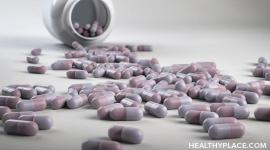Antidepressant Medications for Depression: What They Are, How They Work

Antidepressants are medications used to treat depression and several other disorders. With proper treatment, often including antidepressants, 70% - 80% of people with major depressive disorder (MDD) can achieve a significant reduction in symptoms.1
Antidepressant drugs are not happy pills, and they are not a panacea. They are prescription drugs that come with risks as well as benefits and should only be taken under a doctor's supervision. They are, however, one depression treatment option. Taking medications for depression is not a sign of personal weakness –it is the treatment of a disease.
Whether an antidepressant medication is the best depression treatment option depends on the severity of depression, history of the illness, the patient's age and their personal preferences. Most people do best with a combination of antidepressants and depression therapy.
How Antidepressants Work
Most antidepressants are believed to work by slowing the removal of certain chemicals from the brain. These chemicals are called neurotransmitters (such as serotonin and norepinephrine). Neurotransmitters are needed for normal brain function and are involved in the control of mood and in other functions, such as eating, sleep, pain and thinking.
Antidepressants work by making these natural chemicals more available to the brain.
Types of Antidepressants
There are several types of antidepressants, including:
- Selective serotonin reuptake inhibitors (SSRI antidepressants)
- Serotonin norepinephrine reuptake inhibitors (SNRI antidepressants)
- Tricyclic antidepressants (tricyclics)
- Monoamine oxidase inhibitors (MAOIs)
- Others
Each type of antidepressant works on brain chemicals in slightly different ways. You can find a complete list of antidepressants under each category here, along with links to information about each individual antidepressant medication.
SSRI Type of Antidepressants
SSRIs are a group of depression medications that include drugs such as:
SSRI antidepressants act only on the neurotransmitter serotonin.
SSRIs have fewer side effects than tricyclic antidepressants and MAOIs, perhaps because they act only on one body chemical, serotonin. Typical side effects of SSRI antidepressants include:
- Dry mouth
- Nausea
- Nervousness
- Insomnia
- Headache
- Sexual problems
Tricyclic Type of Antidepressants
Tricyclic antidepressants drugs have been used to treat depression since the 1950s. This type of depression medication acts on neurotransmitters like serotonin and other chemicals as well.
Tricyclics include drugs like:
- Amitriptyline (Elavil, Levate)
- Amoxapine (Asendin)
- Clomipramine (Anafranil)
- Desipramine (Norpramin)
- Doxepin (Silenor)
- Imipramine (Tofranil, Tofranil-PM)
- Nortriptyline (Pamelor, Aventyl)
- Protriptyline (Vivactil)
- Trimipramine(Surmontil, Trimip, Tripramine)
Tricyclic antidepressants tend to have more side effects than SSRIs. Common side effects include:
- Dry mouth
- Blurred vision
- Constipation
- Difficulty urinating
- Worsening of glaucoma
- Impaired thinking
- Tiredness
- Changes in blood pressure and heart rate
Other Types of Antidepressants
Other types of antidepressants work on different brain chemicals or work in ways different than tricyclics or SSRIs. Commonly used medications are:
- Bupropion (Welbutrin)
- Desvenlafaxine (Pristiq)
- Duloxetine (Cymbalta)
- Mirtazapine (Remeron)
- Venlafaxine (Effexor)
The newer antidepressants in this class tend to have fewer side effects than tricyclic antidepressants and vary by medication.
Important Warning When Taking Depression Medication
In 2004, the U.S. Food and Drug Administration (FDA) ordered makers of all antidepressant medications to include a "black box warning" (the most serious warning) on their products' labeling to include warnings about increased risks of suicidal thinking and behavior, known as suicidality, in children, adolescents and young adults (ages 18 to 24) during initial treatment (generally the first one to two months).
Antidepressants increased the risk compared to placebo of suicidal thinking and behavior (suicidality) in children, adolescents, and young adults in short-term studies of Major Depressive Disorder (MDD) and other psychiatric disorders. Anyone considering the use of [drug name] or any other antidepressant in a child, adolescent, or young adult must balance this risk with the clinical need.
Short-term studies did not show an increase in the risk of suicidality with antidepressants compared to placebo in adults beyond age 24; there was a reduction in risk with antidepressants compared to placebo in adults aged 65 and older.
Depression and certain other psychiatric disorders are themselves associated with increases in the risk of suicide. Patients of all ages who are started on antidepressant therapy should be monitored appropriately and observed closely for clinical worsening, suicidality, or unusual changes in behavior. Families and caregivers should be advised of the need for close observation and communication with the prescriber.
Interactions of Antidepressants with Other Mediations
All types of antidepressants can have an effect on many other medicines. Whether prescription or over-the-counter, you should tell your doctor about all medications, supplements, herbal products or anything else being taken.
MAOI antidepressants carry significant risk of interaction and any medication should only be taken under a doctor's supervision. Additionally, taking any medication which increases serotonin increases the risk of a potentially dangerous condition known as serotonin syndrome. Illegal drugs are particularly dangerous.
Which Antidepressant Drug Is Best For Me?
All antidepressant drugs are considered to be equally effective, but certain types of antidepressants work best for people with certain depression symptoms. For example, people who are depressed and agitated do best when they take an antidepressant drug that also calms them down. People who are depressed and withdrawn may benefit more from an antidepressant drug that has a stimulating effect. A doctor can match a person's symptoms with the antidepressant that is right for them.
Antidepressants Are Not a Magic Bullet
While antidepressant drugs can treat depression, they cannot solve problems in people's lives. Some mental health professionals worry people who could benefit from psychotherapy turn to antidepressant drugs for a "quick fix." The best approach is generally a combination of counseling and depression medications, but the correct treatment for a specific patient depends on many factors. However, it's important to remember that with medical treatment, most people will experience significant recovery from depression.
APA Reference
Tracy, N.
(2022, January 4). Antidepressant Medications for Depression: What They Are, How They Work, HealthyPlace. Retrieved
on 2026, January 14 from https://www.healthyplace.com/depression/antidepressants/antidepressant-medications-for-depression


